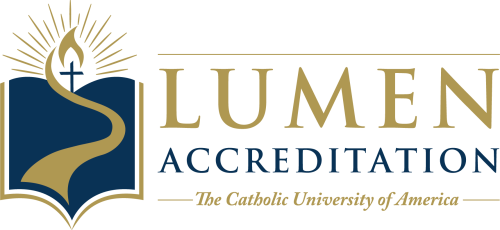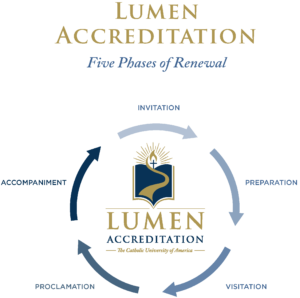“Lumen Accreditation, sponsored by the Institute for the Transformation of Catholic Education, is a hopeful undertaking for the good and future of Catholic schools in the United States.”
Jason Slattery, Ed.D., Director of Catholic Education, Archdiocese of Saint Paul and Minneapolis
Lumen Catholic School Accreditation
Advancing and promoting the distinctive excellence of K-12 Catholic education.
"Lumen Accreditation is the most exciting, important, and innovative initiative in K-12 Catholic education happening today."
Dr. Thomas Smith, former Dean of the School of Arts and Sciences,
The Catholic University of America
"We had our Lumen Retreat today and I am amazed at how well it went...One of my staff told me she has never seen the employees open up about their faith so much. What a great way to start the accreditation process and to start the year."
Lumen Catholic School Principal

Igniting Renewal. Illuminating Pathways. Transforming Hearts.
Mission
Lumen Accreditation, offered through The Catholic University of America, advances and promotes the distinctive excellence of K-12 Catholic school education. Guided by Christ and illumined by the Church’s rich educational heritage, we accompany Catholic school communities as they strive for continuous growth in fulfilling their mission.
Vision
Lumen Accreditation ignites renewal, illuminates pathways, and transforms hearts to foster the full flourishing and distinctive excellence of our nation’s K-12 Catholic schools.
Lumen Accreditation is a gift for school communities that desire a distinctly Catholic accreditation program. Catholic schools have a unique culture that is rooted in the Gospel message, which permeates the life of the school. “Its [the Catholic school’s] proper function is to create for the school community a special atmosphere animated by the Gospel spirit of freedom and charity, to help youth grow according to the new creatures they were made through baptism.”1
The foundation of Lumen Accreditation is the Catholic church’s rich educational heritage, which will renew Catholic schools in the search for truth, beauty, and goodness. The Lumen Accreditation program was developed to unify the renewal of Catholic schools nationally. As a service to Jesus Christ and His church, Lumen integrates foundational elements of the Church’s teachings on Catholic education and seeks to meet the needs of the individual charisms of dioceses and Catholic schools.
The Institute for the Transformation of Catholic Education (ITCE) at the Catholic University of America partnered with the bishops of the United States and other educational leaders to create a framework of guiding principles for K-12 Catholic schools. Dioceses may permit their schools to choose Lumen Accreditation; in this way, schools will align their goals for improvement with the Church’s vision for Catholic school mission and identity.
___________________________________________
1. Declaration on Christian Education, Gravissimum Educationis, §35.
Accreditation is an important quality assurance process in which a school or diocese voluntarily seeks an external body to help it measure its effectiveness in fulfilling its mission and setting a course for continuous improvement. In this process, an accrediting body and a school mutually agree on a framework and standards of excellence, and work together to support the school community in its striving for greater attainment of those standards.
While the above statement is true for any accreditation process, a Catholic accreditation calls schools to something greater. In a Catholic accreditation, school communities are called to be more than successful, they are called to be faithful; faith and reason are authentic pathways to knowledge and wisdom.1 As such, culture is an essential element to a Catholic accreditation process which leads to the continuous improvement of a Catholic school community and is best conveyed in Divini Illius Magistri:
“Christian education takes in the whole aggregate of human life, physical and spiritual, intellectual and moral, individual, domestic and social, not with a view of reducing it in any way, but in order to elevate, regulate and perfect it, in accordance with the example and teaching of Christ. Hence the true Christian, product of Christian education, is the supernatural man who thinks, judges and acts constantly and consistently in accordance with the right reason illumined by the supernatural light of the example and teaching of Christ.”2
With an aim towards true Christian education, Lumen Accreditation assists schools to align their community more fully to the example and teaching of Christ.
_________________________________________________
1. Habiger Institute for Catholic Leadership, The Heart of Culture.
2. Catholic Teaching on Education, Divini Illius Magistri, §95-96.

Lumen’s accreditation cycle spans six years and includes five phases: Invitation, Preparation, Visitation, Proclamation, and Accompaniment.
Invitation
- Application
- Onboarding
Preparation
View the Preparation phase graphic here.
- Illuminate the Mission: Staff Retreat
- Community summary
- NSBECS (2nd edition) standards self-reflection
- Catholic Identity Program Effectiveness Surveys
- Assurances
- Strategic planning
- Catholic School/Diocesan Discernment
- Renewal priorities
Visitation
- In-person visit conducted by a team of Catholic educational leaders
Proclamation
- Accreditation report
- Ratification of accreditation
Accompaniment
- Biennial briefs
- Formative feedback processes
- Resource sharing across Lumen membership schools and dioceses
- Diocesan Catholic school accreditation visits (for diocesan-level accreditation)
What is accreditation?
Accreditation is an important quality assurance process in which a school or diocese voluntarily seeks an external body to help it measure its effectiveness in fulfilling its mission and setting a course for continuous improvement. In this process, an accrediting body and a school mutually agree on a framework and standards of excellence and work together to support the school community in its striving for greater attainment of those standards.
What is distinctive about Catholic accreditation?
Catholic accreditation is unique in a world of secular accrediting agencies because it asks Catholic schools to evaluate every aspect of the school in light of their Catholic philosophy. This integration is missing in secular accreditations, which hampers a Catholic school’s ability to further and to grow in their unique mission.
How is Lumen Accreditation distinctive?
Lumen Accreditation provides pathways for the renewal and transformation of all member Catholic schools through a process that integrates the Church’s rich heritage of academic excellence and Catholic philosophy.
The Lumen Accreditation program also includes a retreat, which traces the mission of the Trinity down to the individual Catholic educator, and a discernment process founded in Church documents.
Are you currently accrediting schools and dioceses?
Yes, we will serve 280 schools in the 2024-2025 academic year. Please see Lumen member (arch)dioceses and schools below.
We are currently accepting applications to future Lumen Accreditation cohorts. Please apply here.
How do I sign up for my school, consortium, or diocese to be accredited?
You can apply to Lumen Accreditation here.
Is Lumen Accreditation recognized in my state?
Lumen Accreditation provides a distinctly Catholic accreditation to K-12 schools nationwide. While some states have access to a state or regional Catholic accreditation, Lumen is the first to offer this service on a national level — there are 35 states without access to a Catholic accreditation.
How will Lumen Accreditation benefit students?
Students attending Catholic schools accredited by Lumen will benefit from school communities that focus on academic excellence in the search for truth, beauty, and goodness aimed at the full flourishing of the human person. Lumen Accreditation’s member schools seek to develop students that are both successful in life and faithful to God by striving to serve the highest cause, to seek the highest good, to follow the more excellent way, and to inspire others to do the same.
Lumen Membership
By the Numbers
11 States 20 (Arch)Dioceses 389 Catholic Schools 128 Early Learning Programs
Contact Lumen Accreditation
itce-lumen@cua.edu
202-319-6523
"A collaborative and systematic exercise of assessing a school's catholicity would serve to identify, clarify, and strengthen its effectiveness in its service of Christ and the Church."
Archbishop J. Michael Miller, CSBThe Holy See's Teaching on Catholic Schools
"[The Church] establishes her own schools because she considers them as a privileged means of promoting the formation of the whole man, since the school is a center in which a specific concept of the world, of man, and of history is developed and conveyed."
Congregation for Catholic EducationThe Catholic School, 8



